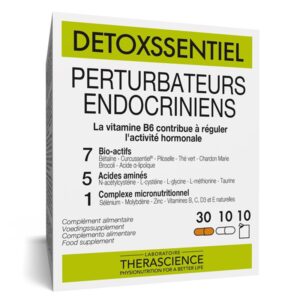ENDOCRINE DISRUPTORS
“According to the World Health Organization, endocrine disruptors are “”substances or a mixture of substances that alter the functions of the endocrine system and thereby induce adverse effects in an intact organism and its offspring””
Their origin is multiple:
compounds of natural origin (hormones and phytoestrogens) present in certain types of plants;
compounds of artificial origin, manufactured for a defined purpose, without the effect on the hormonal system being studied;
compounds of artificial origin, intentionally manufactured for their hormonal effect.
Cosmetics and hygiene products (make-up, deodorant, perfume, toothpaste …), cleaning products (disinfectant, detergent, laundry …), food packaging, toys …
They consist of many chemical substances, the most representative of which are parabens, phthalates, brominated flame retardants, fluorinated surfactants, dioxins, bisphenol A, perchlorate, pesticides …
French regulations have banned various chemical substances such as bisphenol A. However, some endocrine disruptors remain in soil, water and air and can have adverse health consequences, even after they are banned.
The toxic actions of endocrine disruptors come from their interactions with our hormonal system.
They can thus:
to mimic the action of a hormone;
block the action of a hormone;
interfere with the action of a hormone;
That is why the periods during which the organs are in formation or in development, and thus subject to the regulation of the hormones (embryonic, fetal period, childhood, puberty and adolescence) are windows of exposure to risk, during which it is It is essential to limit this exposure and help the body eliminate these endocrine disruptors.
Numerous scientific studies have shown that endocrine disruptors can alter reproductive functions and lead to malformations of reproductive organs. They are also thought to be responsible for the development of some types of hormone-dependent cancers (including thyroid, breast, testis, prostate and uterine cancers), which have increased dramatically over the last 50 years. They would also lead to an increase in the number of cardiovascular diseases of cardiovascular diseases and diseases of civilization such as obesity and type 2 diabetes.
Faced with exposure to endocrine disruptors, it is essential to carry out targeted detoxification to neutralize and eliminate these toxic compounds that invade our environment. This detoxification can be performed by everyone over the age of 18, especially men and women during pre-conception, or by people with fertility disorders. Puberty is also a good time for this type of treatment, which can also be recommended in people with type 2 diabetes or those with thyroid conditions.


